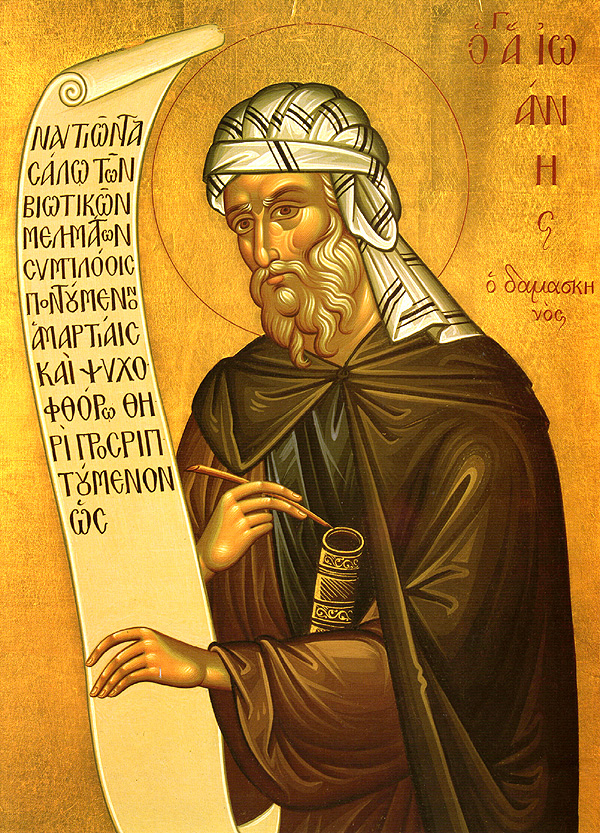Saint John Damascene
 John was first the chief minister to Caliph Abdul-Malik and later a monk in the Monastery of St. Sava the Sanctified. Because of his ardent defense of the veneration of icons during the reign of the iconoclastic Emperor Leo the Isaurian, John was maligned by the emperor to the Caliph, who cut off his right hand. John fell down in prayer before the icon of the Most-holy Theotokos, and his hand was rejoined and miraculously healed. Seeing this miracle the Caliph repented, but John no longer desired to remain with him as a nobleman. Instead, he withdrew to a monastery, where, from the beginning, he was a model to the monks in humility, obedience and all the prescribed rules of monastic asceticism. John composed the Funeral Hymns and compiled the Octoechos (The Book of Eight Tones), the Irmologion, the Menologion and the Paschal Canon, and he wrote many theological works of inspiration and profundity. A great monk, hymnographer, theologian and soldier for the truth of Christ, Damascene is numbered among the great Fathers of the Church. He entered peacefully into rest in about the year 776 at the age of 104.
John was first the chief minister to Caliph Abdul-Malik and later a monk in the Monastery of St. Sava the Sanctified. Because of his ardent defense of the veneration of icons during the reign of the iconoclastic Emperor Leo the Isaurian, John was maligned by the emperor to the Caliph, who cut off his right hand. John fell down in prayer before the icon of the Most-holy Theotokos, and his hand was rejoined and miraculously healed. Seeing this miracle the Caliph repented, but John no longer desired to remain with him as a nobleman. Instead, he withdrew to a monastery, where, from the beginning, he was a model to the monks in humility, obedience and all the prescribed rules of monastic asceticism. John composed the Funeral Hymns and compiled the Octoechos (The Book of Eight Tones), the Irmologion, the Menologion and the Paschal Canon, and he wrote many theological works of inspiration and profundity. A great monk, hymnographer, theologian and soldier for the truth of Christ, Damascene is numbered among the great Fathers of the Church. He entered peacefully into rest in about the year 776 at the age of 104.
Reflection
Obedience, coupled with humility, is the foundation of the spiritual life, the foundation of salvation and the foundation of the overall structure of the Church of God. The great John Damascene-great in every good thing-as a monk left a deep impression on the history of the Church by his exceptional example of obedience and humility. Testing him one day, his elder and spiritual father handed him woven baskets and ordered him to take them to Damascus and sell them there. The elder established a very high price for the baskets, thinking that John would not be able to sell them at that price but would have to return with them. John, therefore, firstly had to go on a long journey; secondly, he had to go as a poor monk to the city where he, at one time, had been the most powerful man after the Caliph; thirdly, he had to seek a ridiculously high price for the baskets; and fourthly, should he not sell the baskets, he would have made this enormous journey, there and back, for nothing. In this way, the elder wished to test the obedience, humility and patience of his famous disciple. John silently prostrated before the elder and, without a word, took the baskets and started on his journey. Arriving in Damascus, he stood in the market place and awaited a buyer. When he told the interested passers-by the price of his goods, they laughed at and mocked him as a lunatic. He stood there the whole day, and the whole day he was exposed to derision and ridicule. But God, Who sees all things, did not abandon His patient servant. A certain citizen passed by and looked at John. Even though John was clad in a poor monk's habit and his face was withered and pale from fasting, this citizen recognized in him the one-time lord and first minister of the Caliph, in whose service he had also been. John also recognized him, but they both began to deal as strangers. Even though John named the all-too-high price of the baskets, the citizen purchased and paid for them without a word, recalling the good that John Damascene had once done for him. As a victor, holy John returned to the monastery rejoicing, and brought joy to his elder.
O Gracious God, forgive us our past sins and protect us from future sins. O Merciful God, have mercy on all Thine innocent creatures, who suffer because of us, and ease their suffering.
Source: Prologue from Ohrid

